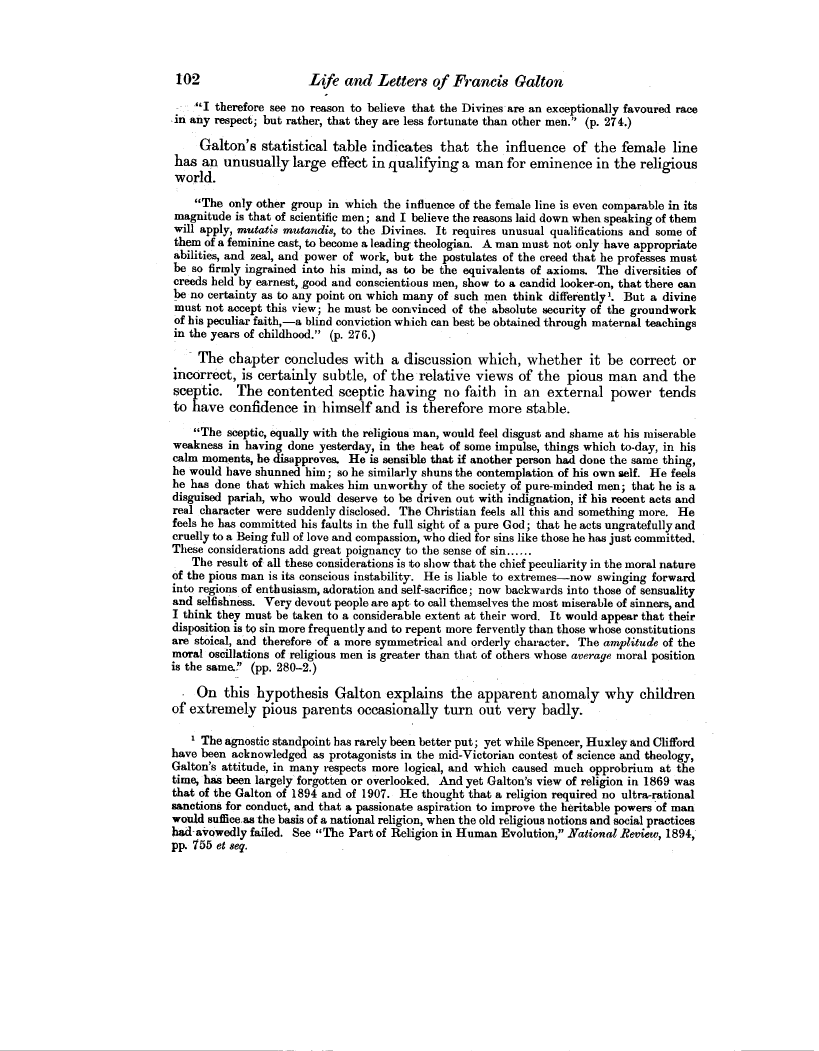102 Life and Letters of Francis Galton
- -"I therefore see no reason to believe that the Divines are an exceptionally favoured race .in any respect; but rather, that they are less fortunate than other men." (p. 274.)
Galton's statistical table indicates that the influence of the female line has an unusually large effect in qualifying a man for eminence in the religious world.
"The only other group in which the influence of the female line is even comparable in its magnitude is that of scientific men; and I believe the reasons laid down when speaking of them will apply, mutatis mutandis, to the Divines. It requires unusual qualifications and some of them of a feminine cast, to become a leading theologian. A man must not only have appropriate abilities, and zeal, and power of work, but the postulates of the creed that he professes must be so firmly ingrained into his mind, as to be the equivalents of axioms. The diversities of creeds held by earnest, good and conscientious men, show to a candid looker-on, that there can be no certainty as to any point on which many of such men think differently'. But a divine must not accept this view; he must be convinced of the absolute security of the groundwork of his peculiar faith,-a blind conviction which can best be obtained through maternal teachings in the years of childhood." (p. 276.)
The chapter concludes with a discussion which, whether it be correct or incorrect, is certainly subtle, of the relative views of the pious man and the sceptic. The contented sceptic having no faith in an external power tends to have confidence in himself and is therefore more stable.
"The sceptic, equally with the religious man, would feel disgust and shame at his miserable weakness in having done yesterday, in the heat of some impulse, things which to-day, in his calm moments, he disapproves. He is sensible that if another person had done the same thing, he would have shunned him; so he similarly shuns the contemplation of his own self. He feels he has done that which makes him unworthy of the society of pure-minded men; that he is a disguised pariah, who would deserve to be driven out with indignation, if his recent acts and real character were suddenly disclosed. The Christian feels all this and something more. He feels he has committed his faults in the full sight of a pure God; that he acts ungratefully and cruelly to a Being full of love and compassion, who died for sins like those he has just committed. These considerations add great poignancy to the sense of sin
The result of all these considerations is to show that the chief peculiarity in the moral nature of the pious man is its conscious instability. He is liable to extremes-now swinging forward into regions of enthusiasm, adoration and self-sacrifice; now backwards into those of sensuality and selfishness. Very devout people are apt to call themselves the moat miserable of sinners, and I think they must be taken to a considerable extent at their word. It would appear that their disposition is to sin more frequently and to repent more fervently than those whose constitutions are stoical, and therefore of a more symmetrical and orderly character. The amplitude of the moral oscillations of religious men is greater than that of others whose average moral position is the same." (pp. 280-2.)
On this hypothesis Galton explains the apparent anomaly why children of extremely pious parents occasionally turn out very badly.
' The agnostic standpoint has rarely been better put; yet while Spencer, Huxley and Clifford have been acknowledged as protagonists in the mid-Victorian contest of science and theology, Galton's attitude, in many respects more logical, and which caused much opprobrium at the time, has been largely forgotten or overlooked. And yet Galton's view of religion in 1869 was that of the Galton of 1894 and of 1907. He thought that a religion required no ultra-rational sanctions for conduct, and that a passionate aspiration to improve the heritable powers of man would suffice.as the basis of a national religion, when the old religious notions and social practices had-avowedly failed. See "The Part of Religion in Human Evolution," National Review, 1894, pp. 755 et seq.

